高级英语写作unit two 作业讨论
- 格式:doc
- 大小:23.50 KB
- 文档页数:2
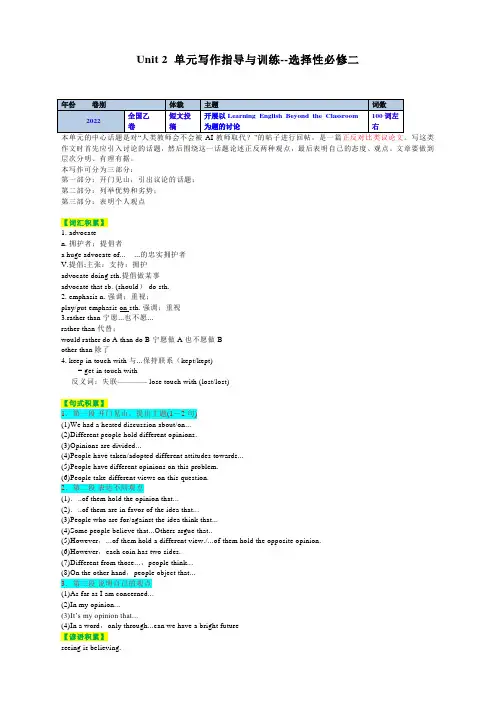
眼见为实。
Nothing so bad, as not to be good for something.塞翁失马,安知非福。
Nothing comes out of the sack but what was in it.无风不起浪。
No safe wading in an unknown water.未知水深浅,涉水有危险。
No rule without an exception.有规则必有例外。
No rose without a thorn.没有不带刺的玫瑰。
No root, no fruit.无根就无果。
No piper can please all ears.众口难调。
No one (or man) is born wise or learned.人非生而知之者。
【万能写作模板】模板一Nowadays, there are a growing number of However, they have both advantages and disadvantages.On the one hand, +优点 are helpful. Compared with we can easily get in touch with So we can ask to provide when we On the other hand, +缺点 also have some shortcomings. Firstly, they are , so they can't understand Secondly, they can only do , and can't deal with Although are becoming more popular, I don't think they will模板二1.导入主题There is a widespread concern over the issue that (某个主题,需以句子形式呈现).But it is well known that the opinions concerning this hot topic vary from person to person.2.正方观点A majority of people approve of the opinion that (正方观点).From their point of view,there are two factors contributing to this attitude,which are as follows:in the first place, (原因一).Furthermore, (原因二).3.反方观点On the contrary,some people differ in their opinions on this matter.They hold the view that (反方观点).On the one hand, (原因一).On the other hand, (原因二).4.阐明个人看法As far as I am concerned,I think we should take immediate measures to (个人观点).First of all, .In addition, .Only in this way can we .现在,网购正在被越来越多的消费者所接受。
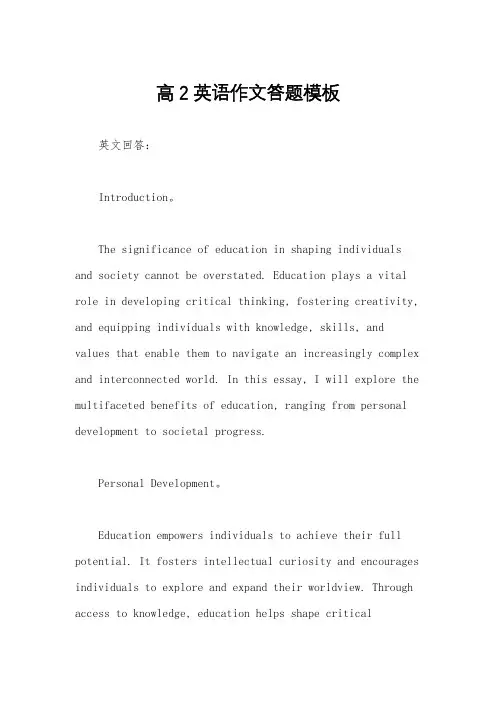
高2英语作文答题模板英文回答:Introduction。
The significance of education in shaping individuals and society cannot be overstated. Education plays a vital role in developing critical thinking, fostering creativity, and equipping individuals with knowledge, skills, and values that enable them to navigate an increasingly complex and interconnected world. In this essay, I will explore the multifaceted benefits of education, ranging from personal development to societal progress.Personal Development。
Education empowers individuals to achieve their full potential. It fosters intellectual curiosity and encourages individuals to explore and expand their worldview. Through access to knowledge, education helps shape criticalthinking skills, fostering the ability to analyze, synthesize, and evaluate information. It also cultivates creativity and innovation, encouraging individuals to think outside the box and generate novel solutions to challenges.Furthermore, education plays a crucial role in developing essential life skills, such as problem-solving, communication, and collaboration. These skills are invaluable in navigating personal and professional life, allowing individuals to adapt to changing circumstances and effectively interact with others. Education also promotes emotional intelligence, helping individuals understand and manage their own emotions and build healthy relationships.Societal Progress。
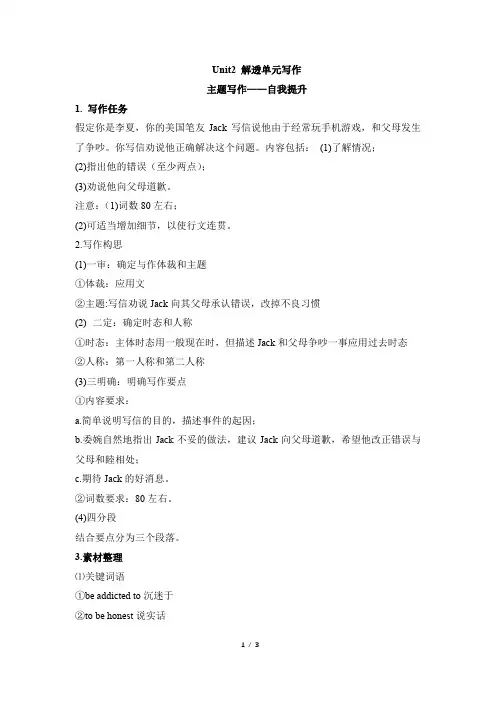
Unit2 解透单元写作主题写作——自我提升1. 写作任务假定你是李夏,你的美国笔友Jack写信说他由于经常玩手机游戏,和父母发生了争吵。
你写信劝说他正确解决这个问题。
内容包括:(1)了解情况;(2)指出他的错误(至少两点);(3)劝说他向父母道歉。
注意:(1)词数80左右;(2)可适当增加细节,以使行文连贯。
2.写作构思(1)一审:确定与作体裁和主题①体裁:应用文②主题:写信劝说Jack向其父母承认错误,改掉不良习惯(2)二定:确定时态和人称①时态:主体时态用一般现在时,但描述Jack和父母争吵一事应用过去时态②人称:第一人称和第二人称(3)三明确:明确写作要点①内容要求:a.简单说明写信的目的,描述事件的起因;b.委婉自然地指出Jack不妥的做法,建议Jack向父母道歉,希望他改正错误与父母和睦相处;c.期待Jack的好消息。
②词数要求:80左右。
(4)四分段结合要点分为三个段落。
3.素材整理⑴关键词语①be addicted to沉迷于②to be honest说实话③focus on (= concentrate on)集中注意力于④instead of而不是⑤what’s more 而且⑥be concerned about 关心⑦apologize to sb.向某人道歉(2)重要句型①说实话,你做的事是不正确的。
__________ __________ __________,what you did is not the right thing, (what引导主语从句)答案:To be honest②首先,你应该集中注意力于学习而不是手机游戏,游戏对你的健康有坏影响。
Firstly, you are supposed to focus on your study instead of mobile phone games,__________ __________ __________ __________ __________ __________ __________.(which引导非限制性定语从句)答案:which have negative effects on your health4. 满分作文Dear Jack,I heard that you had a quarrel with your parents because you are addicted to mobile phone games.To be honest, what you did is not the right thing. Firstly you are supposed to focus on your study instead of mobile phone games, which have negative effects on your health. What's more you shouldn't quarrel with your parents. They were concerned about your health and study, but you didn't show respect, which made them heartbroken. I think you should apologize to them sincerely.Expecting your good news.Yours sincerely,Li Xia 【亮点点评】(1)文章紧扣内容要点,且谋篇布局非常好,三段式结构让文章很有层次。
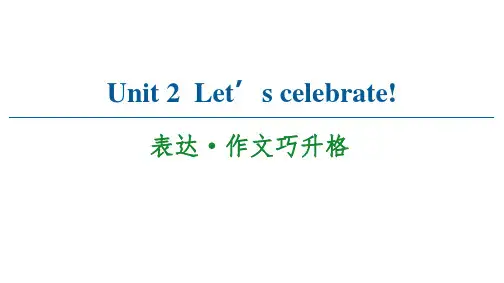
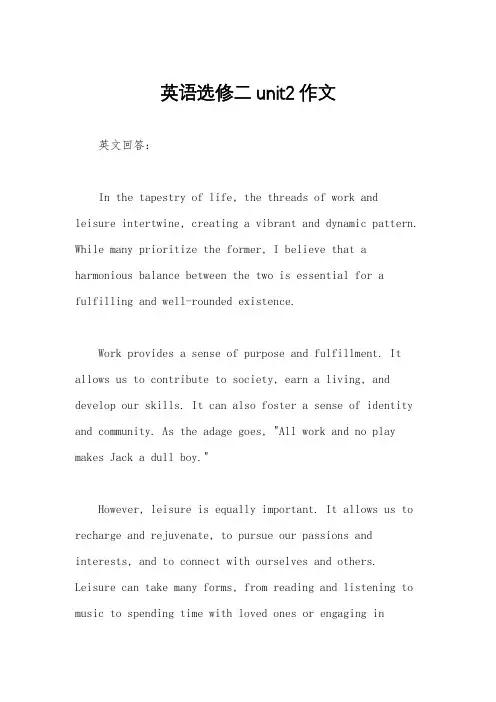
英语选修二unit2作文英文回答:In the tapestry of life, the threads of work andleisure intertwine, creating a vibrant and dynamic pattern. While many prioritize the former, I believe that a harmonious balance between the two is essential for a fulfilling and well-rounded existence.Work provides a sense of purpose and fulfillment. It allows us to contribute to society, earn a living, and develop our skills. It can also foster a sense of identity and community. As the adage goes, "All work and no play makes Jack a dull boy."However, leisure is equally important. It allows us to recharge and rejuvenate, to pursue our passions and interests, and to connect with ourselves and others. Leisure can take many forms, from reading and listening to music to spending time with loved ones or engaging inphysical activities. When we have sufficient time for leisure, we are better able to cope with stress, maintain our mental and physical health, and cultivate a sense ofwell-being.To achieve a healthy work-life balance, it is crucialto set boundaries and prioritize. This may require sayingno to additional work or social commitments that would infringe on our leisure time. It is also important to be flexible and adjust our schedules as needed to accommodate both work and leisure.Furthermore, cultivating a mindset that values bothwork and leisure is essential. We should strive to find meaning and purpose in our work while also recognizing the importance of taking breaks and pursuing our interests.This holistic approach can help us avoid burnout and create a life that is both productive and fulfilling.In my own life, I have experienced the benefits of a balanced work-life approach firsthand. As a medical student, I have a rigorous academic schedule that demandssignificant time and effort. However, I make sure to schedule regular breaks for exercise, relaxation, and social activities. These breaks help me stay focused and motivated in my studies while also preventing me from feeling overwhelmed.中文回答:对于我而言,工作与休闲的生活平衡非常重要。
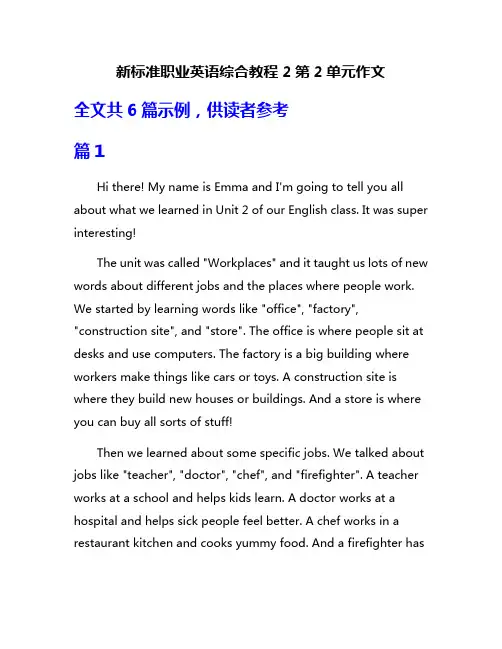
新标准职业英语综合教程2第2单元作文全文共6篇示例,供读者参考篇1Hi there! My name is Emma and I'm going to tell you all about what we learned in Unit 2 of our English class. It was super interesting!The unit was called "Workplaces" and it taught us lots of new words about different jobs and the places where people work. We started by learning words like "office", "factory", "construction site", and "store". The office is where people sit at desks and use computers. The factory is a big building where workers make things like cars or toys. A construction site is where they build new houses or buildings. And a store is where you can buy all sorts of stuff!Then we learned about some specific jobs. We talked about jobs like "teacher", "doctor", "chef", and "firefighter". A teacher works at a school and helps kids learn. A doctor works at a hospital and helps sick people feel better. A chef works in a restaurant kitchen and cooks yummy food. And a firefighter hasto be really brave - they put out fires and rescue people! Isn't that cool?After that, we practiced describing what people do at their jobs using verb phrases. Like a teacher "gives lessons", a chef "prepares meals", and a firefighter "operates equipment" and "provides emergency services". I thought those phrases sounded really grown-up and official!The hardest part was learning to talk about job qualifications and responsibilities. Qualifications are the things you need to get a certain job, like degrees or certifications. And responsibilities are the duties and tasks you have to do at your job. For example, to be a doctor you need to go to medical school for many years. And some of a doctor's big responsibilities are examining patients, prescribing medicine, and sometimes even performing surgery! Pretty intense stuff.We also learned how to write a basic job posting or advertisement. You have to include things like the job title, a little blurb describing the position, list of key responsibilities, qualifications needed, and instructions for how to apply. It was fun pretending to hire people for different wacky dream jobs like "Candy Taste Tester" or "Videogame Player"!Towards the end of the unit, we read a longer text about this really cool place called a "coworking space". It's kind of like an office, but people from different companies or who are freelancers rent desks or tiny offices to work at. I liked the idea because it seems more flexible and social than just working at home by yourself. The passage said coworking spaces often have fun extras like lounges, coffee bars, game rooms and event spaces too!My favorite part was the group activity where we had to design our own imaginary coworking space. My group decided to make ours a place just for kids with lots of games, art supplies, xboxes, and even a indoor playground! Of course we'd also have desks, computers and meeting rooms so kids could get work done too, but making it super fun was our main goal. We called it "The Kidpreneur Clubhouse" - catchy right?Well, that's pretty much everything I can remember about Unit 2. Learning about all the different jobs people do was really interesting. I don't know what I want to be when I grow up yet, but I feel like this unit gave me some good ideas! I could be a racecar driver, or an artist, or maybe even a scientist shooting rockets into space. As long as I work hard, I'm sure I'll find the perfect job for me. Thanks for reading, gotta run!篇2My Favorite JobHi everyone! My name is Timmy and I'm 8 years old. Today I want to tell you all about my favorite job that I want to have when I grow up. It's a really cool job and I think you'll like it too!The job I want is to be a zookeeper! Zookeepers get to work with all kinds of amazing animals every single day. They help take care of the animals, feed them, clean up after them, and make sure they are happy and healthy. How awesome is that?If I was a zookeeper, I would love getting to hang out with the big cats like lions and tigers. They are so powerful and fierce!I would want to play with them and pet them, but I know you have to be really careful because they could hurt you if they get mad. The zookeepers have to be brave.I would also love spending time with the monkeys and apes. They are so funny and silly! I bet it's really fun watching them swing around and make weird noises. Sometimes they throw poop though, so I would have to watch out for that if I was a zookeeper. Yuck!The slithery snakes would probably be a little scary to work with as a zookeeper. Some of them are poisonous which means they could make you really sick if they bite you. But some snakes are friendly and don't bite at all. I think I would get used to them after awhile.One of the best parts would be getting to work with the gentle giants - the elephants, rhinos, and hippos! They are just massive. I would look like a tiny little speck next to those humongous animals. But I hear they can be really calm and nice as long as you don't make them mad. I would give them trees and bushes to munch on.Oh oh! And I can't forget about the super tall giraffes. Wouldn't it be crazy to stand right next to one of those? Their necks are as tall as a whole house! I would have to use a really long broom to reach up and brush their fur. They eat leaves right off the tops of trees. How cool is that?Of course, I would get to see all the cute, fluffy animals too like bunnies, sheep, and those awesome kangaroos that hop everywhere with their babies in their pouches. I might even be allowed to pet some of them sometimes. A zookeeper's life isn't all just cleaning up poop!There are so many different types of animals at the zoo, it would be impossible to get bored. Every day would be an adventure seeing what the funny monkeys are up to or learning about how to care for a new animal. Plus, you get to teach kids and share facts about the different creatures. I would love that part since I'm a kid myself!Zookeepers have to study biology and animal behavior to really understand how to take care of all the unique animals properly. They have to know what each species likes to eat, what temperatures and environments they need, how to keep them active and engaged, and so much more. It's like being an animal doctor almost! I'm really good at science, so I think I could handle that part.The thing I would hate most about being a zookeeper is probably having to clean out the smelly animal pens and pick up all the poop and gunk. That would be so gross! But I guess it's an important part of keeping the animals healthy. Maybe I could hold my nose and bear it since I'd get to play with the cute animals right after!Another hard part would be when animals get sick or injured. Zookeepers have to help give them medicine and bandage them up. I wouldn't want any of my animal friends to be hurting! And ifan animal passes away, that would be really sad. I might cry a lot. But overall there's way more happy times than sad times when you work that close with wildlife.Zookeepers get to interact with wild, exotic beasts from all over the world that most people never get to see in person. They get to learn their behaviors and help make sure they stay around for a long, long time. To me, that sounds like an amazing job!Some kids want to be firefighters, police officers, or astronauts when they grow up. That's fine, but for me, I can't imagine anything better than being a zookeeper. Getting to be up close with majestic creatures every day and helping take care of them would be a dream come true!Of course, I'm only 8 years old, so I've got a long way to go before I can start studying to be a real zookeeper. But I'm going to work really hard in school, especially in science classes, so I can learn everything I need to know. And then watch out lions, tigers, and bears (oh my!), because Timmy the Zookeeper is coming for you!篇3My Favorite ThingsHi everyone! My name is Emma and I'm going to tell you about some of my very favorite things in the whole wide world. Get ready because this is going to be super exciting!My #1 favorite thing is my amazing family. I have the best mom and dad ever. My mom works at a big office downtown. She's really smart and always helps me with my homework. My dad is a construction worker and he builds really cool buildings and houses. He's really strong and funny too! I also have an older brother named Jack who is 10 years old. Sometimes he can be annoying but he's actually pretty nice to me most of the time. We always have fun playing video games and watching movies together. Jack is my best friend.Another one of my favorite things is my dog Buddy. Buddy is a golden retriever and he's the cutest, fluffiest pup you'll ever see! Whenever I get home from school, Buddy comes running up to greet me wagging his tail like crazy. He always makes me laugh with his silly puppy dog faces and goofy personality. I love taking Buddy on walks around the neighborhood and to the dog park to play fetch. He's honestly just the sweetest, most loyal dog in the universe.Speaking of things I love to do, playing sports is definitely at the top of my list of favorite activities. Soccer is probably my #1sport - I play on a team every Fall and we practice twice a week after school. I'm a forward and I've scored lots of goals! I also really like basketball, swimming, and gymnastics. Basically any sport that involves running around and being active is a winner in my book. It's so much fun and keeps me healthy and energized. Plus my teammates are all my great friends so practices and games are just one big party.You know what else I cannot get enough of? Ice cream! Chocolate is my all-time favorite flavor but I honestly don't think I've ever met an ice cream I didn't like. My family loves going to the local creamery on Friday nights to get big sundaes or milkshakes. It's become our little weekly tradition. Whenever we have ice cream at home, I always beg my parents for an extra big scoop. It's just so delicious and creamy...I'm smiling just thinking about it!I'm a total bookworm too. Reading is one of my most very favorite activities ever. I'll read absolutely anything - novels, comic books, magazines, you name it! But I especially love fiction stories with adventure, mystery, or magic. Some of my favorite book series are Harry Potter, Percy Jackson, The Borrowers, and The Boxcar Children. I get totally swept up in the amazing worldsand characters. Reading just transports me to another reality for a little while. It's the best way to uso your imagination!Speaking of using my imagination, I really love art class at school. Getting to draw, paint, sculpt with clay - it's all just so fun and creative. I'm certainly no master artist or anything, but I have a blast working on different projects. Making crafts like potholders and jewelry is tons of fun as well. Anything where I can tap into my creativity gets two thumbs up from me. My room at home is practically wallpapered with all my various artwork!Boy, this is a ton of favorites, huh? Let me try to wrap it up. A couple other things I love are the beach/ocean, going camping with my family, playing fun games like Candyland or Chutes & Ladders, and watching movies (my favorites are animated Disney/Pixar films). Oh and of course candy and other sweet treats are high on the list as well!So those are just some of my many, many favorite things in this awesome world we live in. There are endless sources of happiness and wonder if you just take a minute to appreciate the little joys in life. Spending quality time with loved ones, delicious snacks, playing games and sports, reading and using my creativity - these are the things that make me smile ear-to-ear. Ifeel so grateful to have such an amazing family, friends, home, and millions of tiny pleasures that brighten each and every day.What about you? What are some of your most very favorite things? I'd love to hear all about the special people, activities, foods, and miscellaneous awesomeness that makes your heart happy. The more things to smile about the better, am I right? Well, thanks for reading about my faves - that's all I've got for today. Until next time...bye!篇4Unit 2 - The Working WorldHiya! My name is Billy and I'm 10 years old. Today I want to tell you all about the working world because that's what we learned about in English class. It was really interesting!First up, we learned about different kinds of jobs people can have. There are sooooo many! My dad is a lawyer which means he helps people with laws and goes to court. My mom is a doctor and she helps sick people feel better. I think both of those jobs sound hard!Some other cool jobs are police officers who catch bad guys, firefighters who save people from fires, and astronauts who goto space! I'd love to be an astronauts and fly a rocket ship. Wouldn't that be awesome?Then we learned about workplaces. A workplace is where you go to do your job. My dad's workplace is an office with lots of desks and computers. My mom's workplace is a hospital with beds for sick people.Other workplaces are stores where people sell things, restaurants where chefs cook yummy food, and schools where teachers help kids learn. I'm really glad my workplace is just my school and not somewhere boring like an office!We also talked about what people wear to work. It's called a uniform or work clothes. Police officers wear cool uniforms with badges and hats. Doctors and nurses wear scrubs which are kind of like pajamas. Construction workers wear hard hats and boots to stay safe.My work clothes are just my regular clothes like t-shirts, shorts, and sneakers. Although sometimes I haveto wear fancier clothes like a polo shirt or a dress for special days at school. I don't mind too much though!Another big part of the working world is schedules and hours. A schedule is a plan that says when youhave to work. Mydad works from 9am to 6pm on weekdays. That's a looooong time! I'm so lucky I just have to go to school from 8:30am to 3pm. My mom has a crazier schedule because she has to work night shifts sometimes when other doctors aren't there.We learned that different jobs have different hours based on their schedules. Some people work part-time, which is just a few hours a day. Others work full-time, which is most of the day. A few people even have to work overnight!The last thing we covered was teamwork. Teamwork means working together as a group to get something done. Lots of jobs need good teamwork. Doctors, nurses, and other hospita lworkers have to team up to take care of patients. The cashiers and stockers at a grocery store are a team to keep the store running well.Even kids like me use teamwork! When we have group projects at school, we all have to cooperate and do our parts to get a good grade. Teamwork is really important.Well, that's all the main stuff I learned about the working world! It was a really cool unit. I can't wait to grow up and get a job...just maybe not one where I have to work ridiculous hours like my parents! Being a kid is hard enough work if you ask me. Thanks for reading, bye!篇5My New English Textbook is So Cool!Hi everyone! I'm so excited to tell you about my new English textbook for this year. It's called the New StandardCareer-Oriented Comprehensive English Course 2, and it's awesome! The second unit we just started is all about work and jobs. Learning about careers is so much fun.I can't wait to study all the different job titles and what people do at work. There are so many neat careers to learn about. My dad is an accountant, so I know a little about that job already. But I want to learn about being a doctor, scientist, teacher, chef, firefighter, and all the rest!In the first part of the unit, we're learning basic vocabulary words related to work and the workplace. That means learning the names of different occupations like "dentist" and "zookeeper." It also covers objects and things you'd find in an office, such as computers, desks, filing cabinets, and so on. The vocabulary section has really neat pictures that make it easy to remember what each word means.My favorite part so far has been the dialogues where people talk about their jobs. I love trying to imitate their conversationswith my classmates. It's funny to pretend to be a businessman asking my friend to make some photocopies! The dialogues show common situations that happen at work like attending meetings, giving presentations, and talking on the phone. I can't wait to learn more phrases for workplace smalltalk.The dialogues also sometimes describe what people's typical work days are like. For the firefighter one, they talked about putting out fires, giving CPR, rescuing cats from trees, and other heroic things firefighters do. The scientist dialogue mentioned running experiments, analyzing data, and making groundbreaking discoveries. I think it's so fascinating to learn the nitty-gritty details of how people actually spend their days for different careers.Another really interesting section covers business writing skills. So far we've learned how to format basic things like memos, emails, and reports typically sent between coworkers and managers. The examples show us how to properly organize these documents, what language to use, and standard conventions for professional communication. Maybe I'll get to put those skills to use if I have a part-time job when I'm older!The unit also has tips on interview techniques, networking, workplace etiquette, and so much more. I love the role-playingactivities where we practice greeting others, making introductions, and pretending to interview for different jobs. It's such a blast and makes me feel like a grown-up!Of course, no English textbook would be complete without grammar, reading, and listening exercises. I'll be honest, those parts can be pretty dry at times. But they do help cement all the new words and phrases I'm learning about work and business. The readings cover topics like the daily routines of certain professionals, major industries across different countries, the benefits of freelancing versus traditional employment, and inspirational stories about people's career journeys. As for the listening, we hear people talking about their job searches, experiences at work, office anecdotes, and other work-related discussions.Overall, I'm really enjoying Unit 2 so far. Getting this inside peek into the professional world makes me excited to have a career someday. Maybe I'll be a marine biologist and get to swim with dolphins all day! Or I could be an artist and create amazing paintings. A chef could be fun since I love food so much. Honestly, I'm still pretty undecided on what I want to be when I grow up. But learning about so many fascinating jobs is giving me lots of ideas to consider.I can't wait to see what other career topics are covered in future units of this textbook. I just know Unit 2 is preparing me really well already. Learning all this workplace language and etiquette is making me feel way more grown up. Who knew studying could be this engaging and open up my eyes to the different options for my future? Thanks to this awesome new textbook, I'm becoming a knowledgeable career girl before I've even had my first job!篇6My New English ClassHi! My name is Tommy and I'm 10 years old. I just started a new English class this year called "New Standard Vocational English" and I want to tell you all about it!The class is really cool because instead of just learning boring grammar rules and vocabulary words, we get to learn English through different jobs and careers. In Unit 1, we learned all about being a waiter or waitress at a restaurant. We practiced taking food orders, describing different dishes on the menu, and even role-played being servers and customers. It was a lot of fun!But my favorite unit so far has been Unit 2 all about being a tour guide. Miss Lee, my English teacher, turned our wholeclassroom into a little tourist office. We made brochures and maps for an imaginary city called "Unitopolis." Then we took turns giving tours around the classroom while the other students pretended to be visitors.To get ready, we first had to learn a lot of new vocabulary words related to traveling, sightseeing, and giving directions. Like how to say words like "departure," "arrivals," "check-in," "baggage claim," and stuff like that. We also learned expressions that tour guides use like "If you'll follow me..." or "Our next stop will be..."Then we studied different world-famous landmarks and tourist attractions so we could describe them on our tours. I learned all about places like the Eiffel Tower in Paris, the Great Pyramids in Egypt, the Taj Mahal in India, and the Statue of Liberty in New York City. Giving directions was kind of tricky at first because I had to remember things like "go straight," "turn left," "it's on your right," and so on.When it was finally time to actually give our tours, I was really nervous! But Miss Lee had decorated our classroom with so many cool things that it made it easier. She had made little paper models of famous buildings and put up pictures of famouspaintings and sculptures. There were even stuffed animals representing wildlife you might see on a safari!My favorite part was when I got to take the other students through our "Unitopolis Zoo." I got to describe all the different animals like lions, elephants, and zebras. I even roared like a lion once which made everyone laugh. After we finished going through all the exhibits, I thanked everyone for "coming" and told them to visit the gift shop on their way out for souvenirs!Some of the other tours my classmates gave were amazing too. Peter took us on a tour of "Unitopolis Museum of Art" while Jessica guided us through "Ancient Unitopolis Ruins." It was awesome how creative everyone got with their imaginary cities and tours.At the end of the unit, we had a contest to vote for the best tour guide in the class. The winner got to be Class Tour Guide for a whole week! That meant they got to lead warm-up activities and games all related to their "Unitopolis" tour. I didn't win, but Mary did a great job as our Class Guide teaching us fun new travel words and directions.I learned so much English from this unit by pretending to bea tour guide. Things finally started clicking into place about using the right tenses and sentence structures to describe places, giveinstructions, and talk about the past, present and future. It was way more fun than just memorizing grammar rules from a textbook.My parents were really impressed when I could tell them all about the Leaning Tower of Pisa and Great Wall of China in English. I'm glad this is a multi-year English course too because I'm already excited to learn what other cool jobs and careers we'll get to explore next. Maybe something adventurous like being a explorer, scientist or race car driver? I'll be sure to let you know!For now, I'm working on my souvenir sales pitch: "Get your Unitopolis t-shirts, keychains and coffee mugs here!" Maybe I'll get to use it if Miss Lee lets us open a real gift shop in our classroom. Who knows what fun we'll have next in New Standard Vocational English?。
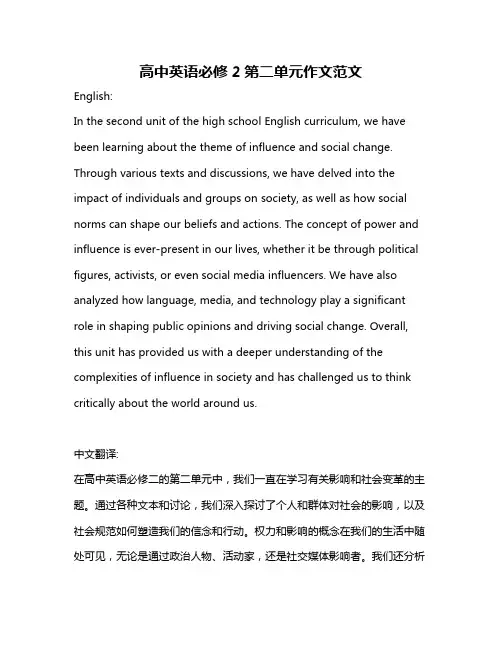
高中英语必修2第二单元作文范文English:In the second unit of the high school English curriculum, we have been learning about the theme of influence and social change. Through various texts and discussions, we have delved into the impact of individuals and groups on society, as well as how social norms can shape our beliefs and actions. The concept of power and influence is ever-present in our lives, whether it be through political figures, activists, or even social media influencers. We have also analyzed how language, media, and technology play a significant role in shaping public opinions and driving social change. Overall, this unit has provided us with a deeper understanding of the complexities of influence in society and has challenged us to think critically about the world around us.中文翻译:在高中英语必修二的第二单元中,我们一直在学习有关影响和社会变革的主题。
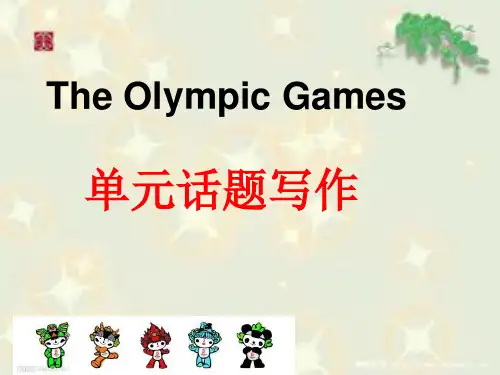
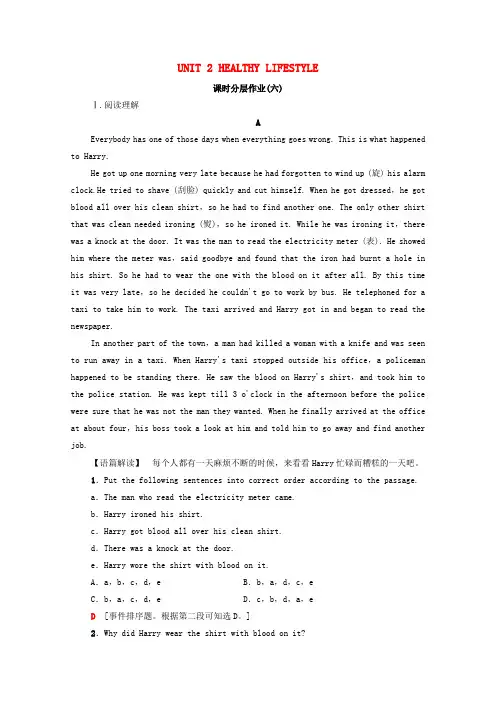
UNIT 2 HEALTHY LIFESTYLE课时分层作业(六)Ⅰ.阅读理解AEverybody has one of those days when everything goes wrong. This is what happened to Harry.He got up one morning very late because he had forgotten to wind up (旋) his alarm clock.He tried to shave (刮脸) quickly and cut himself. When he got dressed,he got blood all over his clean shirt,so he had to find another one. The only other shirt that was clean needed ironing (熨),so he ironed it. While he was ironing it,there was a knock at the door. It was the man to read the electricity meter (表). He showed him where the meter was,said goodbye and found that the iron had burnt a hole in his shirt. So he had to wear the one with the blood on it after all. By this time it was very late,so he decided he couldn't go to work by bus. He telephoned for a taxi to take him to work. The taxi arrived and Harry got in and began to read the newspaper.In another part of the town,a man had killed a woman with a knife and was seen to run away in a taxi. When Harry's taxi stopped outside his office,a policeman happened to be standing there. He saw the blood on Harry's shirt,and took him to the police station. He was kept till 3 o'clock in the afternoon before the police were sure that he was not the man they wanted. When he finally arrived at the office at about four,his boss took a look at him and told him to go away and find another job.【语篇解读】每个人都有一天麻烦不断的时候,来看看Harry忙碌而糟糕的一天吧。
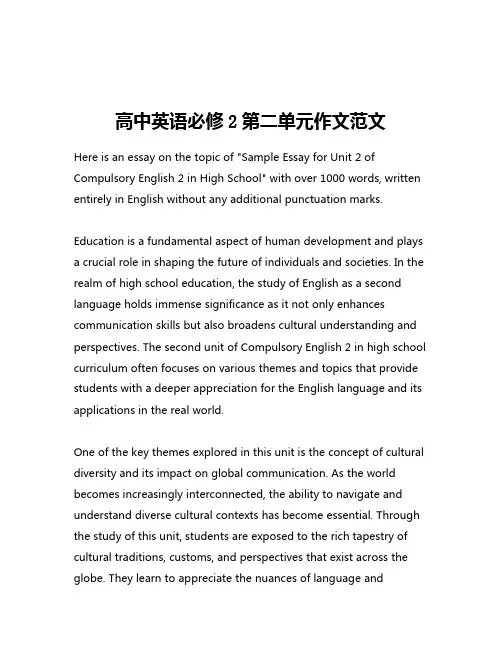
高中英语必修2第二单元作文范文Here is an essay on the topic of "Sample Essay for Unit 2 of Compulsory English 2 in High School" with over 1000 words, written entirely in English without any additional punctuation marks.Education is a fundamental aspect of human development and plays a crucial role in shaping the future of individuals and societies. In the realm of high school education, the study of English as a second language holds immense significance as it not only enhances communication skills but also broadens cultural understanding and perspectives. The second unit of Compulsory English 2 in high school curriculum often focuses on various themes and topics that provide students with a deeper appreciation for the English language and its applications in the real world.One of the key themes explored in this unit is the concept of cultural diversity and its impact on global communication. As the world becomes increasingly interconnected, the ability to navigate and understand diverse cultural contexts has become essential. Through the study of this unit, students are exposed to the rich tapestry of cultural traditions, customs, and perspectives that exist across the globe. They learn to appreciate the nuances of language andcommunication that arise from these cultural differences, and develop the skills to effectively bridge the gaps and foster cross-cultural understanding.Another important aspect of this unit is the emphasis on practical language skills and their application in real-world scenarios. Students are often presented with case studies or role-playing exercises that simulate situations where they must utilize their English language proficiency to engage in meaningful dialogues, negotiate solutions, and effectively communicate their ideas. This hands-on approach not only reinforces the theoretical concepts learned in the classroom but also equips students with the confidence and competence to navigate the challenges of the modern workplace and global marketplace.Moreover, the second unit of Compulsory English 2 often delves into the realm of academic writing and research. Students are introduced to the conventions and structures of academic essays, research papers, and other forms of scholarly discourse. They learn to critically analyze sources, synthesize information, and articulate their own ideas and arguments in a clear and coherent manner. This skill set is not only valuable for their academic pursuits but also prepares them for the rigors of higher education and professional writing.Beyond the specific content and skills covered in this unit, the studyof Compulsory English 2 also plays a crucial role in developing students' overall language proficiency and cognitive abilities. The process of learning a second language has been shown to enhance critical thinking, problem-solving, and cognitive flexibility. As students navigate the complexities of grammar, vocabulary, and cultural nuances, they cultivate a deeper understanding of language structures and the ability to think in multiple perspectives.Furthermore, the study of Compulsory English 2 serves as a gateway to a world of opportunities. In an increasingly globalized economy, the ability to communicate effectively in English is a highly sought-after skill that opens doors to a wide range of academic, professional, and personal pursuits. Whether it is pursuing higher education in an English-speaking institution, securing employment in multinational corporations, or engaging in international travel and cultural exchange, the proficiency gained through this unit can significantly enhance students' future prospects and personal growth.In conclusion, the second unit of Compulsory English 2 in high school curriculum is a vital component of the educational experience that prepares students for the challenges and opportunities of the21st century. Through the exploration of cultural diversity, practical language skills, and academic writing, students develop a comprehensive understanding of the English language and its role in shaping global communication and intercultural exchange. As theynavigate the complexities of this unit, they not only enhance their linguistic abilities but also cultivate essential cognitive and critical thinking skills that will serve them well throughout their academic and professional journeys. The significance of this unit cannot be overstated, as it lays the foundation for a lifetime of personal and professional growth, fueled by the power of the English language.。
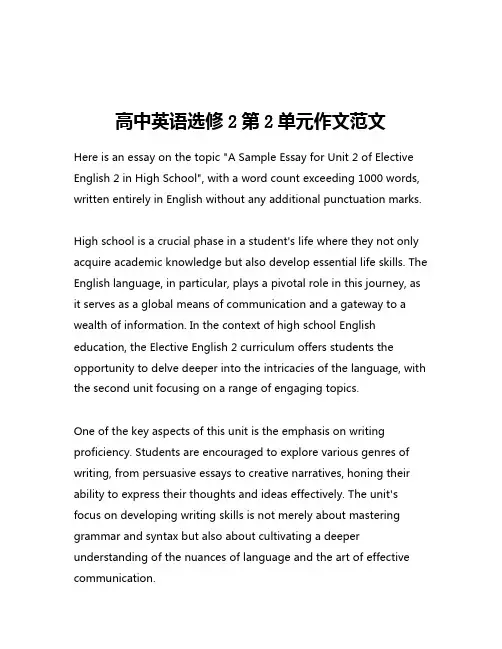
高中英语选修2第2单元作文范文Here is an essay on the topic "A Sample Essay for Unit 2 of Elective English 2 in High School", with a word count exceeding 1000 words, written entirely in English without any additional punctuation marks.High school is a crucial phase in a student's life where they not only acquire academic knowledge but also develop essential life skills. The English language, in particular, plays a pivotal role in this journey, as it serves as a global means of communication and a gateway to a wealth of information. In the context of high school English education, the Elective English 2 curriculum offers students the opportunity to delve deeper into the intricacies of the language, with the second unit focusing on a range of engaging topics.One of the key aspects of this unit is the emphasis on writing proficiency. Students are encouraged to explore various genres of writing, from persuasive essays to creative narratives, honing their ability to express their thoughts and ideas effectively. The unit's focus on developing writing skills is not merely about mastering grammar and syntax but also about cultivating a deeper understanding of the nuances of language and the art of effective communication.As students navigate through the unit, they are exposed to a diverse array of writing styles and techniques. They learn to craft well-structured essays that not only convey their message clearly but also captivate the reader's attention. The unit's curriculum delves into the importance of organization, coherence, and the strategic use of language to achieve the desired impact.One of the standout features of this unit is the emphasis on critical thinking. Students are challenged to analyze complex topics, formulate their own perspectives, and support their arguments with compelling evidence. This process encourages them to move beyond mere rote learning and to develop the ability to think critically and independently.Moreover, the unit's focus on writing also encompasses the importance of research and information gathering. Students are required to delve into various sources, from academic journals to online resources, to gather the necessary information to support their arguments. This exercise not only strengthens their research skills but also helps them to become more discerning consumers of information in the digital age.Another key aspect of the Elective English 2 curriculum is the incorporation of real-world applications. The writing assignmentsand activities within the unit are designed to mirror the types of tasks students may encounter in their future academic or professional pursuits. This approach helps to bridge the gap between the classroom and the real world, equipping students with the skills and confidence they will need to succeed in their future endeavors.Furthermore, the unit's emphasis on collaborative learning and peer feedback encourages students to engage in meaningful discussions and to learn from one another. This collaborative approach fosters a sense of community within the classroom, where students can share their ideas, provide constructive feedback, and learn from each other's perspectives.One of the notable strengths of this unit is its ability to cater to the diverse learning styles and needs of students. The curriculum incorporates a range of teaching methods, from interactive lectures to hands-on writing workshops, ensuring that each student has the opportunity to engage with the material in a way that best suits their individual learning preferences.Moreover, the unit's assessment strategies are designed to provide students with meaningful and constructive feedback, enabling them to identify their strengths and areas for improvement. This approach not only helps students to grow as writers but also instills in them a sense of ownership and investment in their own learning process.In conclusion, the Elective English 2 curriculum, with its focus on the second unit, offers a comprehensive and enriching experience for high school students. By emphasizing the development of writing skills, critical thinking, and real-world applications, the unit equips students with the necessary tools to excel not only in their academic pursuits but also in their future personal and professional endeavors. The collaborative nature of the learning environment, combined with the diverse teaching methods and assessment strategies, creates a dynamic and engaging learning experience that fosters the growth and success of each student.。
英语作业第2模块第2单元的作文英文回答:I have learned a lot from Module 2 Unit 2. It has provided me with a deeper understanding of the importance of language and how it shapes our communication. Languageis not just a tool for conveying information, but also a reflection of our culture and identity. It is fascinating to explore the different ways in which languages are used and how they can vary across different regions and social groups.For example, in English, there are many idioms and expressions that are unique to the language. One such idiom is "the ball is in your court," which means that it is now someone else's turn to take action or make a decision. This expression is often used in a business or negotiation context to indicate that the responsibility has shifted to the other party. In Chinese, a similar expression would be "球在你的手上," which translates to "the ball is in yourhands." Both expressions convey the same idea of someone being in control or having the power to make a decision.Another interesting aspect of language is the use of formal and informal registers. In English, we often switch between formal and informal language depending on the situation and the people we are speaking to. For example, when talking to our friends or family, we might use more casual and colloquial language, while in a professional setting, we would use more formal and polite language. In Chinese, there is also a distinction between formal and informal language. For instance, when addressing someone older or in a higher position, we would use more respectful and formal language, whereas with friends or peers, we can use more casual and informal language.Furthermore, the use of gestures and body language is another important aspect of communication. In English, we often use hand gestures to emphasize our point or to express our emotions. For example, when we want to showthat something is very small, we can use our thumb and index finger to make a small circle. In Chinese, there arealso many gestures that are commonly used. For instance, when we want to express that something tastes delicious, we can rub our stomach with one hand while giving a thumbs-up with the other hand. These gestures add another layer of meaning to our communication and help us convey our message more effectively.In conclusion, language is a complex and fascinating aspect of human communication. It not only allows us to convey information, but also shapes our culture and identity. Through studying Module 2 Unit 2, I have gained a deeper appreciation for the various ways in which language is used and how it can vary across different languages and cultures. It is important to be aware of the different registers, idioms, and gestures used in different languages in order to communicate effectively and understand the nuances of each language.中文回答:我从第2模块第2单元中学到了很多东西。
高中英语选修二unit2作文In the dynamic landscape of high school education, the English language elective curriculum plays a pivotal role in shaping the linguistic and cultural competence of students. Unit 2 of this elective program delves into the intricate world of English language and literature, offering a multifaceted exploration of diverse themes and perspectives. This essay aims to delve into the significance and impact of this unit, highlighting its key aspects and the valuable insights it provides.At the heart of Unit 2 lies a deep appreciation for the richness and complexity of the English language. Students are encouraged to engage with a wide range of literary genres, from classic novels to contemporary short stories, poetry, and drama. This breadth of exposure not only enhances their understanding of the English language but also expands their cultural awareness and critical thinking skills.One of the primary focuses of this unit is the development of advanced reading comprehension and analysis. Students arechallenged to delve into the nuances of literary texts, examining the underlying themes, symbolism, and the author's craft. This process of close reading and textual analysis equips them with the ability to unpack the deeper layers of meaning, fostering a more sophisticated and nuanced understanding of the written word.Alongside the exploration of literary works, Unit 2 also places a strong emphasis on the art of effective written communication. Students are tasked with crafting well-structured essays, research papers, and creative writing pieces that demonstrate their command of the English language. This emphasis on written expression not only hones their technical writing skills but also encourages them to develop a unique and compelling voice.One of the standout features of this unit is its interdisciplinary approach. The curriculum seamlessly integrates elements from various fields, such as history, sociology, and philosophy, allowing students to explore the intersections between literature and the broader social and cultural landscape. This holistic perspective encourages students to think critically and make connections beyond the confines of a single discipline, preparing them for the multifaceted challenges they will face in their academic and professional pursuits.Moreover, Unit 2 places a strong emphasis on the development ofcritical thinking and analytical skills. Through the analysis of complex literary texts and the crafting of well-reasoned arguments, students hone their ability to think critically, question assumptions, and formulate informed opinions. This skill set extends far beyond the realm of English language and literature, serving as a foundation for success in a wide range of academic and professional endeavors.The impact of Unit 2 on the personal growth and development of students cannot be overstated. As they engage with diverse perspectives and grapple with complex themes, students are challenged to confront their own biases, expand their worldviews, and develop a deeper understanding of the human experience. This transformative process not only enhances their academic performance but also fosters empathy, cultural sensitivity, and a lifelong appreciation for the power of language and literature.Furthermore, the skills and knowledge gained in Unit 2 have far-reaching implications for students' future success. The ability to communicate effectively, think critically, and engage with diverse perspectives are highly valued in the modern workforce and academic landscape. By equipping students with these essential skills, Unit 2 prepares them for the demands of higher education and the ever-evolving job market.In conclusion, the high school English language elective Unit 2 is atransformative educational experience that goes beyond the mere acquisition of language proficiency. It is a multifaceted program that cultivates a deep appreciation for the English language, fosters critical thinking and analytical skills, and promotes a holistic understanding of the human experience. Through its comprehensive approach, Unit 2 empowers students to become well-rounded, culturally aware, and adaptable individuals, poised to thrive in the dynamic challenges of the 21st century.。
必修二Unit2 Wildlife Protection写作作业设计一、单元写作任务(倡议书或演讲稿)假定你是李华,你们学校将举办以“Protect Wild Animals”为主题的英语演讲比赛。
请你根据以下提示写一篇英语演讲稿。
1.野生动物的现状;2.保护建议;3.美好愿景。
注意:1. 词数80左右; 2. 可以适当增加细节,以使行文连贯;二、话题词块梳理三、教材好句精选参考答案二、话题词块梳理Problems (问题):1.endangered wildlife /species;2. die out;3. 以惊人的速度;4. mass extinction;5. on average;6. in danger(of extinction)7. be concerned/worried about...8. 下降了/下降到9. a large number of;10. 当谈论到Causes (原因):1.由猎杀,栖息地丧失及污染引起;2. 对某人来说很难适应变化;3. be hunted illegally;4. make profits5.由于树木的砍伐;6. cut down;7. 由于疾病/缺乏食物而死亡Purposes (目的):1.in order to save the species from extinction;2. to keep them safe from attacks;3. intend to do;4. 为了实现人与动物和谐共生;5. search for;6.为了......;7.被用于做......;8. 为了增加......的数量;9. 旨在做;10.企图做...... Measures (解决措施):Government &Society 政府社会层面:1.make people aware of the problem;2. preserve natural habitats;3. take measures to do sth.;4. place sth. under national protection;5. clean up habitats;6. carry out a plan;7. 激发公众兴趣;8. search for solutions;9. plan an animal rescue center;10. 为......提供庇护;11.设立自然保护区;12. 为.....建造美好家园Individuals(个人层面):1.stop illegal hunting;2. 为濒危动物发声;3. give a moving speech;4. 为保护野生动物发声;5. 学会与大自然和谐相处;6. stop being a threat to...;7. change our way of life;8. 不购买由濒危物种制成的货品;9. take care of / care for animals;10. make an effective poster;11. 是时候做某事;12. 做某事取决于某人Results (成效):1.make a lot of progress;2. be removed from the endangered species list;3. as a result;4.开始稳步增长;5. 继续安全蓬勃发展;6. 回归大自然三、教材好句精选问题:1.dying out;2. are becoming extinct ;原因:1.aim to, natural habitats;2. make people aware of, endangered wildlife;3. are becoming increasingly more concerned about;4. adapt to;5. observe;6. also reminded of;7. make profits措施及结果:1.a profit;2. watched over , keep them safe from attacks;3. recovered;4. 2015年6月,藏羚羊从濒危物种名单中删除。
高一必修二英语unit twoppt作文全文共3篇示例,供读者参考篇1Title: The Importance of Unit Two in the High School English CurriculumIn the high school English curriculum, Unit Two plays a vital role in helping students develop their language skills and cultural awareness. This unit focuses on themes such as relationships, technology, and communication, which are essential in modern society. Through studying Unit Two, students not only improve their language proficiency but also gain a deeper understanding of the world around them.One of the key aspects of Unit Two is its emphasis on relationships. Students learn how to communicate effectively with others, express their thoughts and emotions, and build strong interpersonal connections. By studying topics such as friendship, family, and social media, students develop the skills they need to maintain healthy relationships in both their personal and professional lives.Moreover, Unit Two also explores the impact of technology on communication. In today's digital age, technology plays a crucial role in how we interact with others. Through studying this unit, students learn how to navigate the complexities of online communication, including social media, email, and video conferencing. By understanding the benefits and challenges of technology, students can use it more effectively to connect with others and share their ideas.Another important aspect of Unit Two is its focus on cultural awareness. By studying different cultural norms, traditions, and values, students gain a broader perspective on the world. This helps them become more open-minded and empathetic towards people from diverse backgrounds. In addition, learning about different cultures enhances students' language skills by exposing them to a variety of linguistic styles and expressions.In conclusion, Unit Two is a crucial part of the high school English curriculum. By studying relationships, technology, and communication, students develop important language skills and cultural awareness. This prepares them to succeed in a globalized world where effective communication and understanding of others are essential. As educators, we mustcontinue to emphasize the importance of Unit Two in shaping well-rounded and culturally aware individuals.篇2Unit Two in the second year of high school English focuses on a variety of topics ranging from daily routines to hobbies and interests. One of the key assignments in this unit is a PowerPoint presentation (PPT) where students are required to create a presentation exploring a topic related to the themes covered in the unit.For my PPT presentation, I chose to focus on the topic of the importance of daily routines in maintaining a healthy lifestyle. I began by introducing the concept of daily routines and explaining how they can impact our physical and mentalwell-being. I then discussed the benefits of establishing a consistent routine, such as improved productivity, better time management, and reduced stress levels.Next, I shared some examples of effective daily routines that people can incorporate into their lives, such as waking up early, exercising regularly, eating a balanced diet, and setting aside time for relaxation and self-care. I also included tips on how tocreate a personalized routine that works best for individual preferences and schedules.In the following slides, I delved into the science behind the connection between daily routines and health, citing research studies that have shown the positive effects of consistent habits on overall well-being. I also provided practical advice on how to stick to a routine, including setting realistic goals, tracking progress, and staying motivated.To conclude my presentation, I emphasized the importance of making daily routines a priority in order to achieve long-term health and happiness. I encouraged my classmates to take small steps towards establishing their own routines and to seek support from friends and family members if needed.Overall, my PPT presentation was well-received by my peers and teacher. It not only demonstrated my understanding of the unit's themes but also showcased my ability to communicate effectively through visual aids and storytelling. I thoroughly enjoyed the process of creating the presentation and found it to be a valuable learning experience.篇3Unit Two of the Grade One English course is a crucial part of the curriculum. In this unit, we delve into the fascinating world of technology and innovation. With topics ranging from the history of technology to the impact it has on our daily lives, students are exposed to a wide range of concepts and ideas.One of the key aspects of this unit is the PowerPoint presentation assignment. Students are tasked with creating a presentation on a topic related to technology and presenting it to their classmates. This assignment not only enhances their understanding of the topic but also improves their communication and presentation skills.To excel in this assignment, students must first choose a topic that interests them. Whether it's the latest advancements in artificial intelligence or the evolution of smartphones, selecting a topic that they are passionate about will make the research and presentation process more enjoyable.Next, students must conduct thorough research on their chosen topic. They should gather information from reputable sources such as books, academic journals, and trustworthy websites. It is important to critically evaluate the information gathered to ensure its accuracy and relevance to the topic.Once the research is complete, students can begin drafting their PowerPoint presentation. It is essential to organize the information in a clear and concise manner, using bullet points, images, and diagrams to enhance understanding. Students should also practice their presentation multiple times to improve their delivery and confidence.On the day of the presentation, students should dress appropriately and arrive early to set up their equipment. They should speak clearly and confidently, making eye contact with their audience and using gestures to emphasize key points. After the presentation, students should be prepared to answer questions from their classmates and engage in a discussion about the topic.Overall, the PowerPoint presentation assignment in Unit Two is an excellent opportunity for students to showcase their knowledge and skills in technology. By putting in the effort and following the steps outlined above, students can create a compelling presentation that will impress their classmates and teachers.。
单元写作——制作海报海报的使用场合非常广泛,它包括活动宣传、招聘广告和人物介绍等。
海报通常包括标题、正文和结尾三个部分:标题介绍主要信息,正文提供更多有关的信息,并阐述理由;结尾一般提出倡议,具体根据海报类型进行调整,符合海报主题。
制作海报时,要注意:1.海报的主题要鲜明。
2.海报的具体内容应条理分明,使读者一目了然。
3.海报的语言应清晰、简练、重点突出,尽量使用省略句,力求简洁生动。
4.海报的版面要新颖、美观,可采用不同的字体和颜色,还可以加入插图,形式活泼多样。
______________________ (活动标题)When it comes to ________________ (活动主题), all the students are expected to learn more about ________________ (活动相关知识). As we all know, ________________ (活动主办方) will invite many experts to communicate with us. We believe in this way we can ________________ (理由一). What's more, ________________ (理由二). Therefore, as scheduled, the ________________ (活动) will be shown in the ________________ (活动地点).So, if you are interested in it, don't hesitate and come to join us!※开头常用句式1.We'll have a show/football match on July 16th.7月16日我们将举行一场演出/足球赛。
牛津版英语unit2作文The Oxford English curriculum unit 2 is a comprehensive and engaging exploration of the English language that delves into the fundamental aspects of grammar vocabulary and communication skills essential for effective language proficiency the unit begins by introducing the concept of parts of speech highlighting the key roles that nouns verbs adjectives and adverbs play in constructing meaningful sentences and conveying ideasone of the core focuses of this unit is the in-depth examination of nouns delving into the various types of nouns such as proper nouns common nouns collective nouns and abstract nouns students are guided through the nuances of noun usage and learn how to accurately identify and employ nouns in their writing and speech this knowledge forms the foundation for understanding sentence structure and enhancing overall linguistic competencethe unit then transitions to the study of verbs exploring the different verb tenses and their applications students learn to differentiate between action verbs linking verbs and helping verbs andunderstand how to conjugate verbs to express past present and future actions this understanding of verb usage is crucial for constructing grammatically correct and coherent sentencesin addition to nouns and verbs the unit dedicates significant attention to adjectives and adverbs these parts of speech play a vital role in adding descriptive richness to language by modifying nouns and verbs respectively students explore the various types of adjectives such as descriptive adjectives possessive adjectives and demonstrative adjectives and learn how to effectively incorporate them to enhance the clarity and expressiveness of their communicationthe unit also covers the importance of prepositions in establishing spatial and temporal relationships within sentences students delve into the proper usage of prepositions and how they can be combined with other parts of speech to create more nuanced and precise languagefurthermore the unit emphasizes the significance of pronouns in maintaining coherence and avoiding repetition in written and spoken discourse students learn to identify and appropriately use personal pronouns relative pronouns demonstrative pronouns and indefinite pronouns to create smooth and cohesive languagea key component of this unit is the exploration of sentence structure and the various ways in which simple sentences compound sentences and complex sentences can be constructed students gain a deeper understanding of subject verb agreement subject verb object patterns and the appropriate placement of modifiers to create well-structured and effective sentencesin addition to the grammatical aspects the unit also delves into the realm of vocabulary development students are introduced to strategies for expanding their lexical repertoire such as using context clues to determine word meanings exploring word roots prefixes and suffixes and utilizing reference materials like dictionaries and thesaurusesthe unit also highlights the importance of developing strong communication skills emphasizing active listening techniques and the art of crafting clear and persuasive written and oral expressions students learn how to effectively organize their ideas structure their arguments and convey their messages in a coherent and impactful mannerthroughout the unit students are provided with ample opportunities to apply their newfound knowledge and skills through a variety of engaging activities and exercises these include writing assignments grammar practice vocabulary building tasks and interactivediscussions that reinforce the concepts coveredthe oxford english curriculum unit 2 is a comprehensive and invaluable resource that equips students with a solid foundation in the english language by fostering a deep understanding of grammar vocabulary and communication skills this unit empowers students to become confident and effective communicators capable of expressing themselves clearly and persuasively in a wide range of contextsthe knowledge and skills acquired through this unit serve as a springboard for further language development and academic success as students navigate their educational journeys and engage with the world around them the unit's holistic approach to language learning ensures that students emerge as well-rounded and articulate individuals prepared to thrive in their future endeavors。
Most everyday writing is casual. Tweets, Facebook updates, holiday cards, friendly emails —these have their own simple etiquette, and we don’t spend a lot of time thinking about them before we lick that stamp or hit send.Sometimes, though, the occasion calls for something more formal. Whether it’s a letter to your political representative about an important issue, a cover letter to a potential boss, or a business proposal letter, these require a bit more care if you’re going to be taken seriously. As a lawyer, I write many formal letters each week, and there is an art to doing it well. Here are a few points to keep in mind when you’re writing your own formal letter, whether it will go through the mail or via cyberspace.1. Understand your purpose.Why are you writing? What do you want the reader to do after reading your letter? Do you want to change her mind or convince him to take a specific action? Are you seeking forgiveness? Do you mean to complain about bad service or a faulty product? Are you tryin g to get hired? What’s the “ask”?Once you know this, you can — and should —cut everything out that doesn’t serve that purpose.2. Identify your audience.Knowing your audience helps you choose your language and target your ideas more precisely. I write differently in a letter to another lawyer than I do when the addressee is a non-lawyer executive or even an elderly “pro bono” client. In a letter to the editor, your real audience is the publication’s readers—who are they? (Keep in mind that most newspa pers are written at an 8th or 9th grade reading level.) Don’t use jargon that your reader won’t understand.3. Keep it short.Most of us endure a constant flood of written communications, and we have a limited amount of time to spend reading it. You therefore have a better chance of being read if you keep your letter to one page. A multi-page letter with long paragraphs and complex sentences looks overwhelming. The busy reader will be tempted to set it aside for when she has more time—and she might never get around to picking it up again. Use short paragraphs, short sentences, short words.4. Use simple language.It’s the writer’s job to be understood. Even if your audience is highly educated, you should avoid big words and long, complex sentences. Peopl e aren’t stupid; they’re busy. Make our job easier, and we’re more likely to give your letter the attention it deserves. Formalwriting does not require the use of big words. Don’t try to sound sophisticated; try to be clear. Use “ask” instead of “request.” Say “buy” instead of “purchase.” Instead of “enclosed herewith please find,” just say, “I’ve enclosed” or “Here is. . . .”5. Lead with the most important point.As journalists say, don’t bury your lead. Find a way to open with the idea or information that you most want your reader to focus or act on. The first paragraph might be the only one he reads, so don’t hide the “ask” in the last paragraph.6. Follow the rules.There are rules for formatting a business letter. You ignore them at your peril.7. Proofread. Then proofread again.No matter how grammatically gifted you are, errors and typos can creep in. When you think you’ve finished writing, read your piece slowly and attentively, watching for those typos. Don’t trust spellcheck. If possible, pr int a hard copy of your letter and read it—out loud—with a pen in hand, marking those typos, awkward sentences, confusing lines. If it’s really important, have somebody else read it and let you know if you’ve missed something.8. Let it cool before sending.Especially if you are writing to persuade or complain, you probably are motivated by some pretty strong feelings. Absolutely write your first draft in the white-hot heat of passion. Express your feelings. Get it all on paper. But then . . . before you print and sign, or hit send, walk away for awhile. Go do something else. Let that heat of passion cool. Then come back and re-read what you’ve written. Is it fair? Is it smart? Is it true? Is it kind? Would you regret having it read on television, in front of your boss and your grandmother? Make the changes that seem appropriate after your emotions have settled.Then, and only then, hit send.What have I missed? What is your stickiest communication challenge? Your questions and suggestions are invited.。